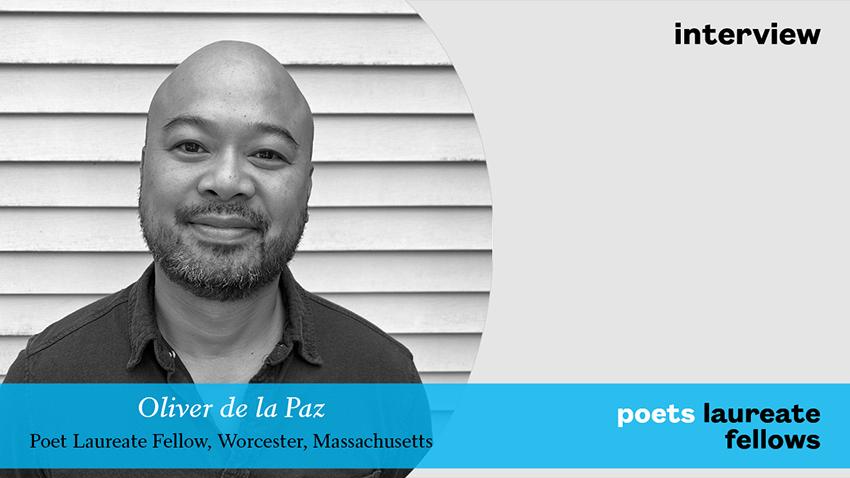
Oliver de la Paz is the author of six poetry collections, including The Diaspora Sonnets (Liveright Publishing Corporation, 2023), which was long-listed for the 2023 National Book Award in Poetry. In 2023, he was named an Academy of American Poets Laureate Fellow. De la Paz will collaborate with the Worcester County Poetry Association in supporting and promoting the Rain Poetry project, a series of public art installations that will be revealed at an annual public ceremony. He will also assist with the production of video and photographic archives of the project culminating in a display of the works that will be available via web, social media, and as a print anthology.
Poets.org: What do you hope for the future of poetry in Worcester, Massachusetts, and what support do you hope future poets laureate in the state have?
Oliver de la Paz: Worcester, Massachusetts, is the second-largest city in New England and it continues to grow. Additionally, the city has a large immigrant population and thousands upon thousands of stories that need to be heard. I’m the city’s third poet laureate. I stepped into the role after Juan Matos, who was a tremendous artist and educator. And before him, Gertrude Halstead served as the Worcester poet laureate until her death. So there have only been three writers who have served in this position, and my hope is that the Worcester Cultural Coalition and the City of Worcester continue to support future poets laureate. A lot of the work poets laureate do isn’t necessarily “public facing,” surprisingly. There’s a lot of collaboration and planning that happens behind the scenes in the service of promoting the work of other writers in the region. I hope that I am able to create collaborative programming with other stakeholders which will be sustained long after I step down and the next poet takes my place.
Poets.org: How has being a poet laureate changed your relationship to your own writing?
OP: I tend to write dark and depressing poems that often deal with trauma or atrocity. That doesn’t really work well for public events, let me tell you. So I’m trying to write poems that reach toward joy and celebration. That’s not to say that I’ve veered away from the presiding tone of my work, but that I’m much more conscious of trying to reach a wider audience.
Poets.org: How can a poet, or poetry, bring a community together?
OP: It’s funny, but I’m most comfortable in the periphery, and becoming the Worcester poet laureate has actually brought the community to me. What I mean is that I’m now more in touch with all the stakeholders of the arts in the city because of the awareness that comes with a public position. So my goal is to, in turn, shine a light on the organizations that have long been working at promoting poetry and spoken word in Worcester. The Worcester County Poetry Association has been around since 1971, promoting the literary arts of the community for quite some time. There’s also a thriving spoken word scene with two magnificent regular open mic events: The Dirty Gerund at Ralph’s Rock Diner and The Poet’s Cauldron at The White Room. The community is hungry for opportunities to hear and share poetry, and I’ve witnessed a surge of young writers attending these events. There’s also a National Baseball Poetry Festival that has started in the city which is held in collaboration with the Worcester WooSox baseball team.
Poetry is happening and the community is genuinely interested in the art; it’s just a matter of helping the whole community know that there are opportunities to join in. I especially see the greatest interest in poetry from our younger writers, and those younger writers bring their families to support them.
Poets.org: What part of your project were you most excited about?
OP: I’m working on a project in collaboration with the previously mentioned Worcester County Poetry Association. The Rain Poetry Project, started by the Worcester County Poetry Association in 2021, brought thirteen poems written by diverse poets from Worcester to bus stops throughout the city. Poems were painted on the concrete using stencils and Rainworks’ rain paint (a paint that is only visible when wet). The poems lasted for two to four months in their locations. The selected poets were then brought together for a community reading with friends and family. This coming year will be the third in which the project has been in place.
What excites me about the project is how we’re expanding its reach to involve more young people. We’ll be soliciting poems from students from the local K-twelve schools, and they’ll have their own entry categories; so the hope is that we’ll get our young poets excited about writing poetry. We also aim to have a print anthology of their work published by the end of the year.
Poets.org: Is there a poem on Poets.org that inspires you and your work in Worcester? How so?
OP: Allison Joseph introduced me to the work of Christopher Gilbert when I first published Names Above Houses. I paid her and the late great Jon Tribble a visit and we stopped by a bookstore in St. Louis. Allison put Gilbert’s book, Across the Mutual Landscape, in my hand and insisted that I buy it, and I did. Later, I learned Christopher Gilbert went to school at Clark University, which is in the heart of Worcester. In particular, I think about his poem “This Bridge Across.”
